
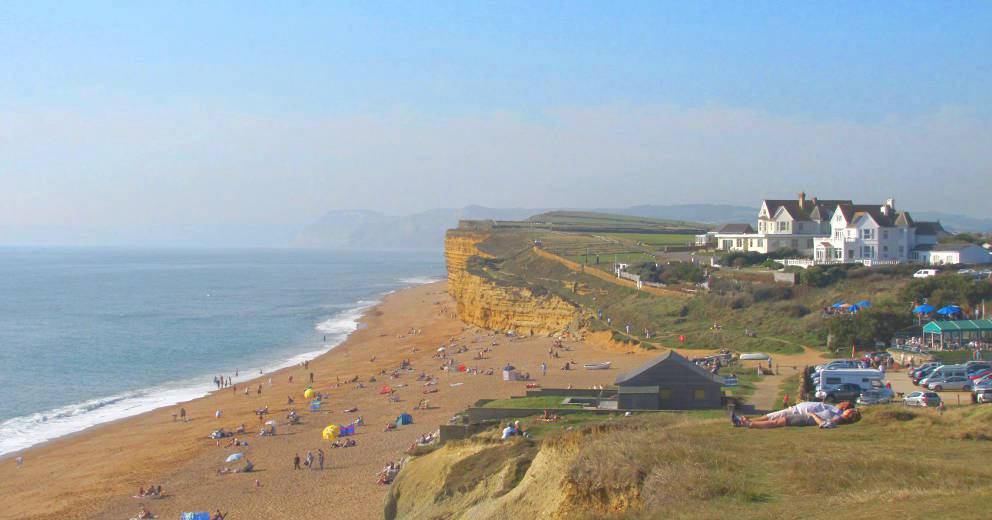
The Coasts of England
Resorts, beaches, coastlines
About-Britain.com
About-Britain.com
- a thematic guide to Britain
- Site index
- Essential
information
- Accidents and emergencies
- Pounds and pennies
- Hotel search
- Budget tourism - Britain on the cheap
- Online shopping from the UK
- Driving in Britain
- Low-cost car-hire
- Travel by train in Britain
- Visitor accommodation
- Hotels in London
- Britain's main attractions
- Food and eating in Britain
- Christmas in Britain
- English pubs
- Places
to visit
- Britain's main attractions
- Interactive tourist map
- Visiting London
- London for free
- Getting round in London
- Shopping in London
- More great English cities
- Oxford and Cambridge
- Tourism by region
- Discover southeast England
- Discover central southern England
- The West of England - Gloucestershire to Dorset
- The Westcountry - Devon and Cornwall
- Sites & heritage in the East of England
- About Scotland
- Attractions by theme
- Issues & institutions
You
are
here: About
Britain ›
Tourism ›
Coasts of England
Beside the sea in England - shorelines beaches & resorts
| Page guide: | Most popular resorts | The English Channel |
| On foot | The west coast | The North Sea coast |
Hotels
in popular English coastal areas
A great selection at best rates
from Booking.com
Bournemouth
Dorset
Jurassic coast
Torquay
Cornwall
Blackpool
Great Yarmouth
Northumberland
Other areas
The English have been enjoying the pleasures of their seashores for over 250 years. It was way back in 1750 that the seaside town of Brighton, 60 miles south of London, began its transformation from fishing harbour into a seaside resort for Londoners, coming to enjoy the health benefits of fresh sea air and sea water. In the early 19th century, the Prince Regent, later King George IV, firmly established the popularity the seaside as a place for leisure, by building the famous Brighton Royal Pavilion, a royal seaside holiday home designed in an exotic Indian oriental style .
Today, Brighton remains a jewel in the crown among the great English seaside resorts , fully equipped to accommodate guests in any season, tourists .... or large conferences . But Brighton is not alone. During the 19th century, all round the English coast, large resorts sprang up, it first for the new middle classes from the big cities, later for the working classes too .
Until the late 1960s and the advent of cheap international flights between Britain and the Mediterranean coast , these resorts were the preferred holiday destinations of English of all classes. They remain popular today, especially for older people and for people wanting a short break from city life.
The English coast on foot.
Work is currently underway to complete a footpath right round the English coast. The project should be ready by 2020. Long sections of the route already exist. It is already possible to walk most of the southwest coast, from Southampton round to Bristol along the southwest coastal path, which follows the stunning coastline from Falmouth, in southern Cornwall, to Ilfracombe, in north Devon.Most popular seaside resorts by coast :
Cities whose names are written in bold have a large hotel capacity and infrastructure for hosting major national and international conferences .-
South coast , the English Channel - from east to west :
Major resorts : Folkestone , Eastbourne, Brighton , Bournemouth , Torquay / Paignton.
Smaller resorts : Ramsgate , Hastings, Newhaven , Worthing, Bognor Regis, resorts on the Isle of Wight , Weymouth, Exemouth -
West Coast Atlantic , Irish Sea - from south to north :
Major resorts : Weston super Mare , Blackpool , Morecambe .
Smaller resorts : Newquay, Bude, Ilfracombe, Minehead, Fleetwood, -
East coast, North Sea - from south to north :
Major resorts : Southend on Sea, Clacton , Great Yarmouth, Scarborough
Other resorts : Lowestoft , Skegness, Bridlington.
General overview of the coasts of England.
1 . The Channel coast - the south coast of England, from Ramsgate (Kent) to Penzance (Cornwall) .
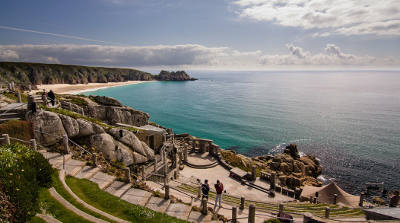 Open
air theatre at Minack, on the southwest tip of Cornwall
Open
air theatre at Minack, on the southwest tip of CornwallSee also: Southeast England
2 . The west coast of England, Land's End to the Scottish border .
The English Atlantic coast. The north coast of Cornwall and Devon is very rocky, but offers beautiful and large sandy beaches. Open to the Atlantic swell, these are the most popular British beaches for surfers. The seaside resorts here are small but popular. The " Atlantic Coast" continues as far as the town of Minehead, a small resort in Somerset . Further north, it becomes the Severn Estuary, though there is a big and popular seaside resort at Weston super Mare, near Bristol .The Irish Sea : North of the Welsh border, the coasts of Cheshire and Lancashire are noted for their great sandy beaches. This coast is well-known for its large popular resorts which grew up in the 19th century to cater for the inhabitants of large industrial cities of northern England. It is a part of the coast that is very rooted in tradition, and the resorts remain popular with people from nearby cities. Blackpool, Britain's most famous seaside resort, likes to give itself the appearance of a small Las Vegas; as well as amusement parks , the city has plenty of casinos, slot machines, cinemas, fast food restaurants and other entertainment venues.
Very different from all that, the coast of the Lake District is quite sparsely populated , except for small coastal towns like St Bees or Whitehaven. While the Lake District itself is a very popular tourist area, the coast is less popular, as this is one of the wettest areas of England. It is also worth noting that there is a nuclear waste reprocessing plant at Sellafield, on the Lake district coast.
3. The North Sea coast - the east coast of England. From Kent to the Scottish border..
Despite its reputation as cold coast, the east coast of England, bordering the North Sea, has plenty going for it. Resorts are relatively rare, and therefore it is a coast that offers long stretches of fairly deserted beaches, especially around East Anglia.The coast of East Anglia is popular with bird watchers, because it is a region rich in sedentary and migratory waterfowl. This part of England, like the Netherlands on the other side of the North Sea, is very flat , and just inland from the coast, there are large areas of fens and an area of lakes known as the Norfolk Broads, very popular for boating. See the East of England.
Halfway up the east coast is a large square bay, called the Wash, one of the most important wetlands and bird sanctuaries in Europe .
To the north of the Wash , the coast alternates between cliffs and flat areas, with relatively little in the way of tourism.
Other sectors of the North Sea coast that are popular with tourists are the coast of North Yorkshire, south of the small historic port Whitby , and the far north coast of Northumberland, a rocky windy coastline exposed to the rigors of the north Sea . This coast is famous for its castles and ancient monasteries . Between these two areas, between the rivers Tyne and Tees, there is an industrial area with some of the largest coalfields in England, where coal mines once stood on the shore, and even sent their workers to work few kilometers under the sea ...
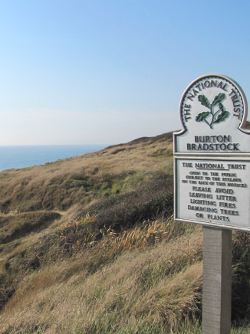
Coastline protected by the National Trust
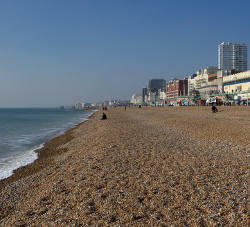
Brighton beach
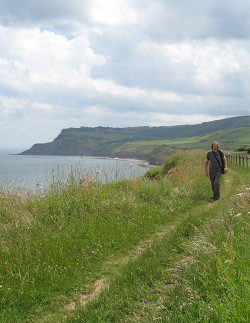
The coast of north Yorkshire
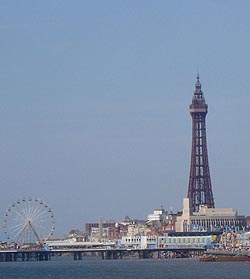
Blackpool
Going
to France too ?
check out The coasts of France
check out The coasts of France

